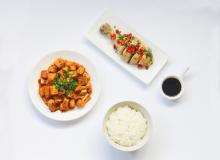Earlier, we discussed various aspects of the topics that affect the rise in blood sugar after meals. This problem has also been bothering many friends. Today we will summarize this topic and give further countermeasures. Do the following to make your post-meal blood sugar better and more stable:
1. Adjust pre-meal blood sugar to keep it neither high nor low. Pre-meal blood sugar directly affects post-meal blood sugar. Pre-meal blood sugar can reflect the status of pancreatic islet function. Therefore, if you want to have good post-meal blood sugar, you must first control pre-meal blood sugar. Levels are very important.
2. Strictly controlling food intake and food types is the key to lowering blood sugar after meals. The more you eat, the higher your blood sugar will be. Food types have a great impact on blood sugar. Foods with high sugar content will cause blood sugar to rise quickly and bitterly after meals. Foods such as buckwheat tend to lower blood sugar. In order to reduce the post-meal peak, you can mix high-glycemic index foods with low-glycemic index foods to improve post-meal blood sugar. For example, if you add vegetables to the porridge or make it into meat porridge, the increase after a meal will be reduced. Also, the same weight of sorghum rice and sorghum rice noodles will have very different blood sugar after meals. This is the problem of not carefully cooking whole grains.
3. Food intake speed, temperature, etc.: The higher the food temperature, the faster the blood sugar rises. The faster you eat, the more obvious the blood sugar rise. Studies have shown that if there is too much salt in food, postprandial blood sugar will also increase due to intestinal changes. The sodium-sugar pump mechanism speeds up sugar absorption.
4. Optimize the order of meals and choose foods with a low glycemic index to use post-meal blood sugar for additional gains. Taking a bite of food first and then a bite of rice can control post-meal blood sugar better than eating directly first. Choosing staple foods with a low glycemic index can reduce the rate at which the staple food raises blood sugar, both of which have additional benefits.
5. The body’s ability to process sugar can be summarized into two major parts:
One is the body’s ability to digest and absorb food. For example, chronic gastroenteritis, post-gastrectomy, chronic pancreatitis, pancreatic enzyme deficiency, diabetic gastroparesis (a type of diabetic autonomic neuropathy), etc. These gastrointestinal diseases will change the effect of this food on postprandial blood sugar. . In terms of hypoglycemic drugs, there are glycosidase inhibitors, which inhibit the conversion of starchy foods into glucose that can be absorbed, thereby slowing down the digestion and absorption of starchy foods and artificially changing the body's ability to process food.
On the other hand, there is the issue of the amount of insulin in the body and insulin resistance. Insulin secretion in the early phase is a problem of normal autosecretion. If the medication can better simulate autosecretion, the effect on postprandial blood sugar will be better, such as repaglinide, and rapid-acting insulin analogues have a better effect on postprandial blood sugar than human insulin. Blood sugar will be better, that is, this mechanism.
Another thing is to prevent it from being a drop in the bucket. If the amount of hypoglycemic medicine is insufficient, the blood sugar will definitely be high after a meal. Repaglinide was used, but only 0.5 mg was used instead of 2 mg. The blood sugar after a meal will definitely not reach the standard.
6. The impact of exercise on postprandial blood sugar. Starting exercise 45 minutes after a meal is very helpful in improving postprandial blood sugar. Many people have the habit of taking a lunch break after lunch. High blood sugar after lunch is a natural thing. Diabetic patients should not be anxious when their blood sugar levels rise after a meal. They should look for corresponding ways to lower their blood sugar based on their post-meal blood sugar levels. They should also pay attention to improving their living and eating habits and participating in some exercise as appropriate.

